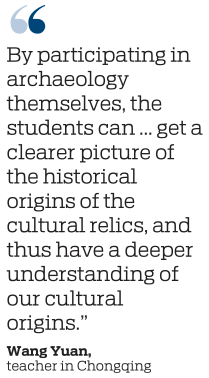Students get a savor of the past
Xinhua | Updated: 2022-12-14 07:22
CHONGQING — Fueled by sensational archaeological and cultural TV programs, documentaries and popular science events, archaeology, mysterious and thus intriguing, has come into the limelight for a greater number of teenage enthusiasts of China's past.
Last month, a group of 21 children aged 6 to 14 visited the Chongqing cultural relics and archaeology institute in Southwest China.
Putting on goggles and gloves, the children used latex, sandpaper and other tools to splice, glue and grind damaged pottery bowls, which were acted as unearthed cultural relics, to experience the basic steps of cultural relic restoration.
Under the guidance of archaeologists and teachers, the youngsters learned about restoring ancient artifacts and attended lectures, science popularization performances and other activities.
"I like to participate in such activities," says Xu Zihao, an 8-year-old student from Zhonghualu Primary School of Chongqing's Yuzhong district. "It's interesting to learn about cultural relics and practice fixing them with my own hands."
The children were also guided through an exhibition hall of restored and duplicated ancient tombs and relics.
By learning about the burial customs, systems and specific aesthetics of their ancestors, the little archaeology enthusiasts were able to enjoy an inspiring journey through history and experience the splendid spiritual culture of ancient China.
"By participating in archaeology themselves, the students can learn the process of the excavation and restoration of cultural relics, get a clearer picture of the historical origins of the cultural relics, and thus have a deeper understanding of our cultural origins," explains Wang Yuan, a teacher of the "Chongqing teenage archaeologists" during the activities.
Feeling the charm of mysterious archaeological investigation and the sense of accomplishment when "discovering" relics can be of great help to cultivate students' interest in history and archaeology, Wang adds.
Since March this year, the Chongqing institute has carried out more than 60 activities of archaeological research and learning, attracting more than 1,800 attendees. Most of the participants are teenagers.
"Allowing children to feel the charm of archaeology from an early age, and building up their awareness of loving and protecting cultural relics, play an important role in cultivating a sense of social responsibility among the youngsters, and improve the level of social-cultural relics protection," Wang says.

























